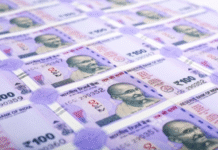New Delhi/Chennai– With the government on Wednesday giving its in-principle approval to the mega merger proposal in the banking sector – the merger of six banks with SBI, State Bank of India chairperson Arundhati Bhattacharya hailed the move as a “win-win” for all.
The nod was given at a cabinet meeting chaired by Prime Minister Narendra Modi, the Union Finance Ministry spokesman told IANS though there was no mention of the mega merger proposal at the media briefing of the cabinet decisions.

The six banks are SBI’s five associate banks – State Bank of Bikaner and Jaipur (SBJJ), State Bank of Hyderabad (SBH), State Bank of Mysore (SBM), State Bank of Patiala (SBP) and State Bank of Travancore (SBT) – as well as the Bharatiya Mahila Bank Limited (BMB).
In a statement issued by SBI, Bhattacharya said: “The merger of SBI and its associate banks is a win-win for both. While the network of SBI would stand to increase, its reach would multiply.
“One can expect efficiencies to be created from rationalisation of branches, common treasury pooling and proper deployment of a large skilled resource base. Currently, no Indian bank features in the top 50 banks of the world. With this merger, some visibility at global level is likely to increase.”
On the talks of approval by the government to the merger, share prices of SBI, SBM, SBJJ and SBT flared up.
“The merger of six banks with SBI is the gateway for consolidation to happen in the banking sector. The decision shows that the government is serious about consolidation in the sector. In fact merger of banks is one of the aspects of Indradanush plan for the sector,” Saswata Guha, director, Financial Institutions at global credit rating agency Fitch Ratings, told IANS.
Indradanush is a seven-pronged plan to revamp the public sector banks announced by the central government last year.
According to Guha, the benefits of the merger will take around 18 months to accrue to SBI as integration of human resources and other aspects have to happen and going by the past mergers – of the State Bank of Saurashtra and State Bank of Indore.
“Post merger SBI will be around 24,000 branch strong and will have a market share of around 25 per cent. I am interested in seeing how the huge scale would benefit SBI,” he added.
The merger will create a banking giant with assets worth around Rs.37 lakh crore.
On May 17, SBI had informed the bourses that it is seeking “in principle sanction” of the central government to enter into negotiation with the six banks to acquire their businesses including assets and liabilities.
Global credit rating agency, Moody’s Investors Service had estimated it would cost SBI around Rs.16.6 billion ($250 million) for the merger and will have limited impact on its credit metrics, including its asset quality and capitalisation level.
It also said the opposition to the merger by the employee unions also poses considerable risk that potential synergies of the merger may not materialise.
Currently, the five associate banks operate as standalone banks with their own financials, board and management team, with oversight from SBI.
In addition, SBJJ, SBM and SBP are also listed with the presence of minority shareholders.
According to SBI, the net profit of the merged entity (SBI and five associate banks) for the year end March 31, 2016 would be Rs.11,590 crore, capital adequacy ratio 12.66, gross NPA Rs.121,969 crore, net NPA Rs.68,894 crore and restructured advances Rs.94,569 crore.
However the unions in the five SBI associate banks are opposed to the merger in this form.
The All India Bank Employees’ Association (AIBEA) has demanded the merger of five associate banks of SBI into one entity.
“It is unfortunate that despite opposition by unions and even political parties, the government has taken the decision to go ahead with the decision to close down the five associate banks and hand their business to SBI,” its general secretary C.H.Venkatachalam told IANS, adding that India needs banking expansion and not consolidation.
“Tomorrow (on Thursday) AIBEA office bearers are meeting in Chennai to take decisions in this regard,” he added.






